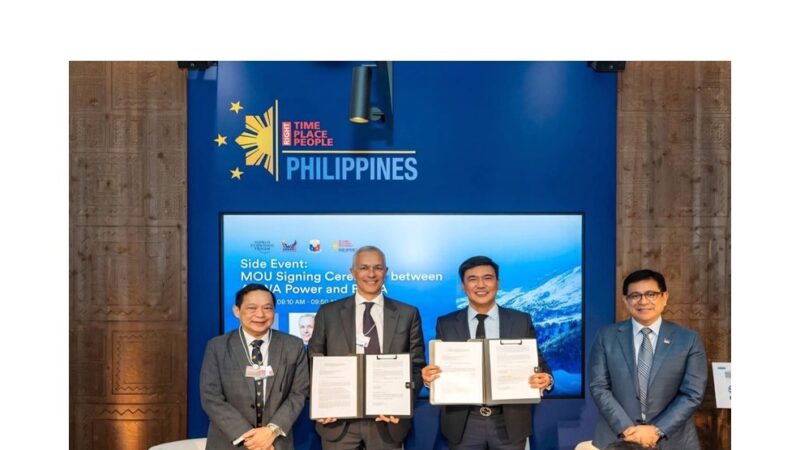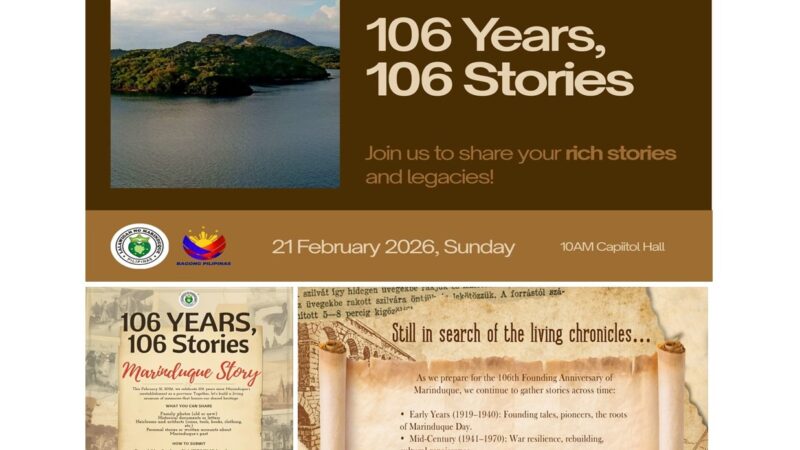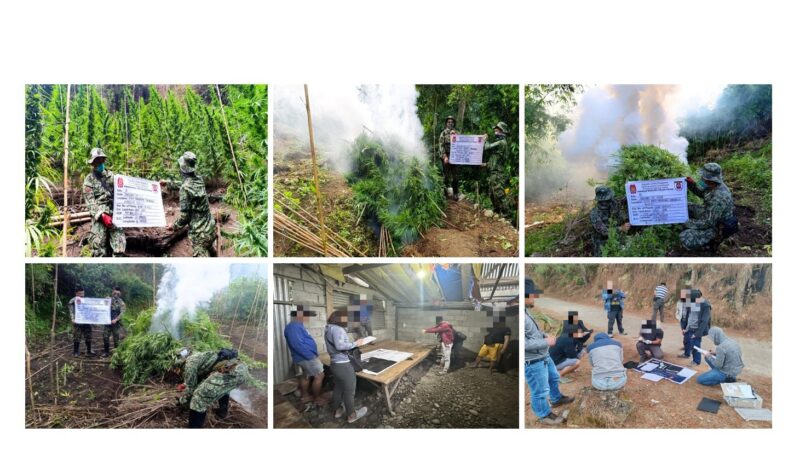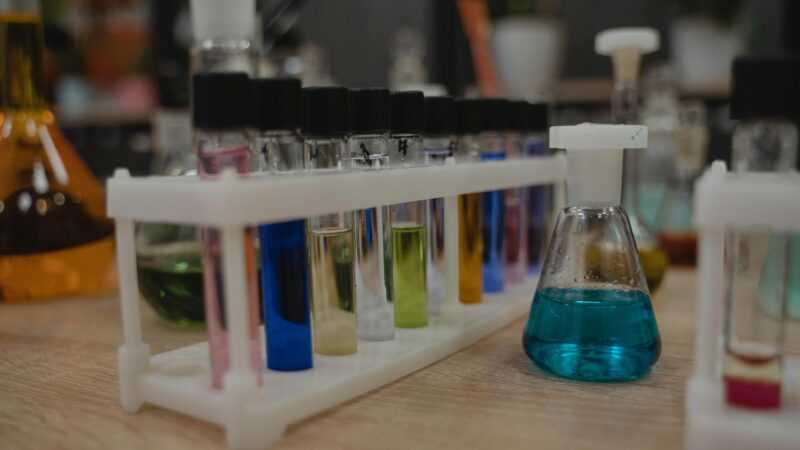BAN Toxics to PBBM: Change the System, Not Just the Way We Think
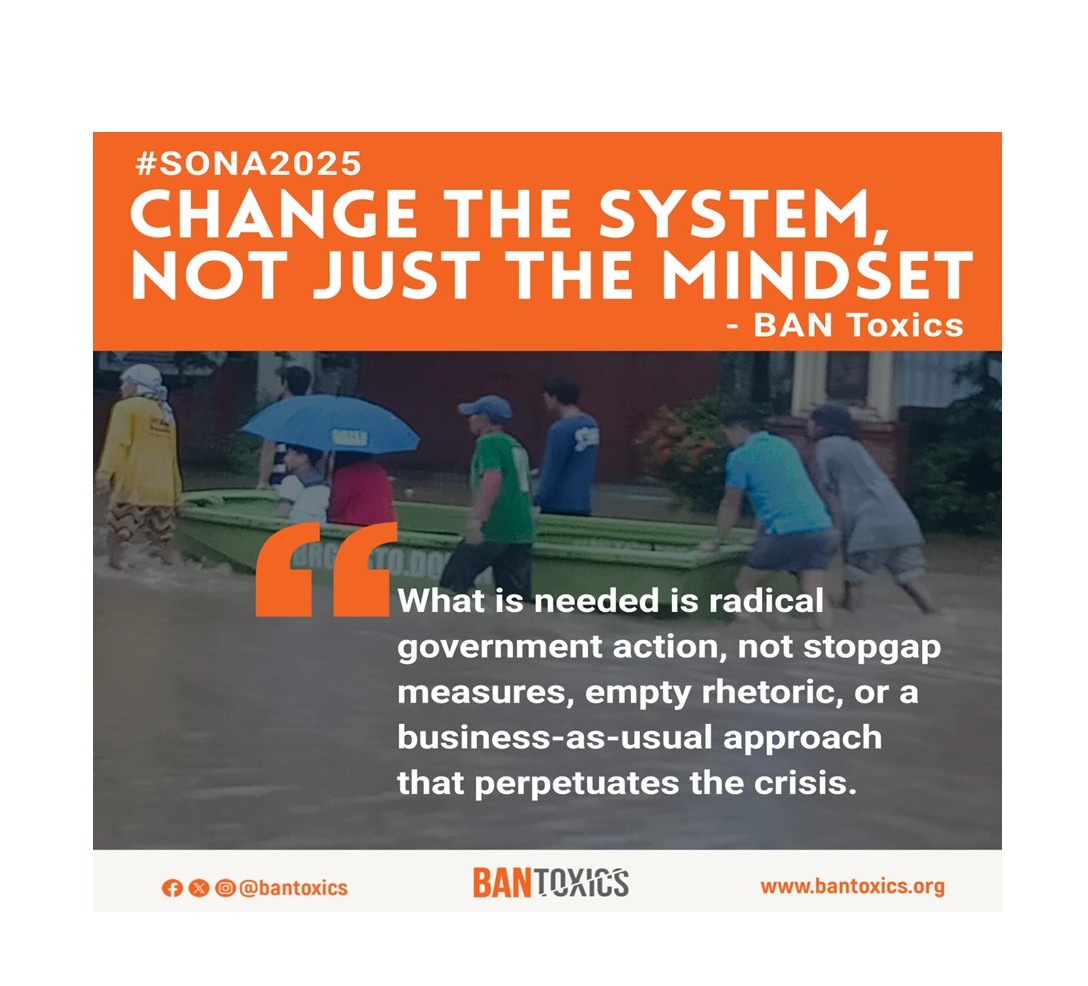
“Halfway through his term, we have yet to see the Marcos Jr. administration make significant efforts in addressing the impacts of the triple planetary crisis of climate change, pollution, and biodiversity loss in the country. What is needed is radical government action, not stopgap measures, empty rhetoric, or a business-as-usual approach that perpetuates the crisis.”
This was the statement of environmental justice organization BAN Toxics, issued just days before the president’s third State of the Nation Address, as the country grappled with widespread flooding brought on by monsoon rains and successive storms.
“The triple planetary crisis is real and we need more than flood control infrastructure, post-disaster aid, and other reactive measures that fail to address the issue at its core,” said Jam Lorenzo, Deputy Executive Director and Policy Development and Research head of BAN Toxics.
According to Lorenzo, tackling the triple planetary crisis requires urgent policy shifts, including a fossil fuel phaseout to confront climate change, a nationwide plastic ban and transformation of waste management systems to curb pollution, and a moratorium on large-scale mining and other extractive activities to halt biodiversity loss.
“We also demand climate accountability from big corporations that have caused and continue to contribute to environmental harm and negative impacts on communities,” Lorenzo added.
Still Fossil-Fueled
In 2023, President Marcos Jr. set the target for the country’s renewable energy (RE) share in the power generation mix to reach 35% by 2030 and 50% by 2040. While this signals a shift toward clean energy, the targets fall short of the Intergovernmental Panel on Climate Change (IPCC) benchmark of 60–70% renewable share by 2030 to stay within the 1.5°C limit.
Though the Paris Agreement allows developing countries like the Philippines to contribute “according to their capacities,” BAN Toxics argues that the country can—and should—go beyond 35% by 2030, especially given its high vulnerability to climate impacts. The group also raised concern over continued government support for fossil gas expansion, such as the renewal of the Malampaya Service Contract in May 2023. Meanwhile coal’s share in the power mix accounts for around 57.2% as of mid-2025, reflecting the country’s ongoing dependence on fossil fuels.
“Our government should act decisively on the climate crisis by committing to a complete, just, swift, and well-supported transition away from fossil fuels,” Lorenzo said.
Drowning in Waste
Following days of intense flooding, waste once again surged to the forefront of public concern. From July 21 to 22, the Metropolitan Manila Development Authority (MMDA) collected 26.37 truckloads of garbage—equivalent to 76.923 metric tons—from various areas across Metro Manila. This comes on top of the 526.8 metric tons of trash recovered from pumping stations between July 18 and 22. A huge volume of plastic wastes make up the hauled trash.
BAN Toxics renewed its call for a comprehensive review of Republic Act 9003, or the Ecological Solid Waste Management Act, pointing to persistent implementation gaps, inadequate infrastructure, improper waste disposal, and limited public awareness. The group underscored the urgency of amending the 24-year-old law, arguing that its current framework remains centered on downstream responses and the traditional “Reduce, Reuse, Recycle” (3Rs) approach. Instead, it called for a shift toward systemic, upstream solutions aligned with zero waste principles.
“The waste crisis cannot be solved by managing trash alone. We need to stop waste from being created in the first place,” said Lorenzo. “This means regulating production, phasing out non-essential single-use plastics, and holding producers accountable for the full lifecycle of their products. These upstream measures are also consistent with the Basel Convention’s framework on Environmentally Sound Management, which emphasizes waste prevention and reduction at source as critical components of sustainable waste governance.”
The group also urged the Marcos Jr. government and the incoming 20th Congress to make the passage of a nationwide ban on single-use plastics a legislative priority. The last attempt to introduce such a measure was way back in 2021, when House Bill No. 9147 was passed by the House of Representatives during the Duterte presidency. Since then, no meaningful effort has been made under the current leadership to pursue or advance a similar proposal, reflecting a continued lack of urgency in tackling plastic pollution.
“Plastics are a major contributor, not just to pollution but to the climate crisis, as 99% of plastics are derived from fossil fuels,” Lorenzo said. “What’s even more alarming is that there are 16,000 chemicals found in plastic, with around 4,200 already identified as hazardous. These pose serious risks to human health, especially to children and vulnerable populations.”
On August 5 to 14, UN member states are set to convene for the second part of the 5th session of the Intergovernmental Negotiating Committee (INC-5.2) to finalize a Global Plastics Treaty aimed at addressing the plastic pollution crisis. BAN Toxics and other civil society organizations are pushing for a treaty with high ambition—one that goes beyond cleanup and recycling to include legally binding targets on plastic production reduction, elimination of toxic chemicals in plastics, and full accountability from plastic producers.
Foreign-Led Mining at the Expense of People and Planet
Since taking office, the Marcos Jr. administration has actively promoted the expansion of large-scale mining, particularly for critical minerals like nickel and copper, which are considered essential for clean energy technologies. In May 2023, the government renewed the Financial and Technical Assistance Agreement (FTAA) of Sagittarius Mines, Inc. for the Tampakan Copper-Gold Project in South Cotabato which is one of the largest and most
controversial mining ventures in the country. The Department of Environment and Natural Resources (DENR) has also lifted suspension and cease-and-desist orders on several mining operations, such as in Brooke’s Point, Palawan, where locals have raised alarm over forest loss and watershed degradation. At the same time, the Department of Trade and Industry (DTI) has been actively inviting foreign investors from Australia, Canada, and Japan to participate in the country’s mining sector, branding it as a key engine of post-pandemic economic recovery and a source of critical minerals. There have also been policy pushes to amend and ease tax rules under the Mining Act of 1995 to make investments more attractive to foreign players.
These government initiatives have drawn criticism from civil society and Indigenous groups, as many mining tenements overlap with protected areas and ancestral domains, posing serious threats to biodiversity, water resources, and local communities.
BAN Toxics is calling for a moratorium and comprehensive review of large-scale mining contracts, while also pushing for amendments to the People’s Small-Scale Mining Act (Republic Act 7076) to strengthen the local mining industry in a way that is genuinely sustainable and committed to protecting the environment.
“Instead of further opening the country to foreign plunder, the government should shift its focus on supporting our artisanal and small-scale miners, who have the potential to contribute meaningfully to the national economy,” said the group. “This support must include capacity-building and access to environmentally sound technologies,” Lorenzo said.
The group also pointed out the irony in how the government extends more incentives to foreign-led large-scale mining operations, while small-scale miners face excessive barriers just to obtain a mining contract. As a result, many artisanal and small-scale gold miners remain in the informal and often illegal sector, despite their significant contribution to the country’s gold production.
Change the System
In a recent government briefing following the torrential rains and widespread flooding, President Marcos Jr. remarked that “we just have to change the way we think.” In response, BAN Toxics emphasized that what is needed is not only a change in mindset but a change in the system itself. The group pointed out that there are clear, concrete, and achievable solutions to address what the president referred to as “the new normal.”
“We urge the president and the newly elected lawmakers to take decisive steps in confronting the triple planetary crisis. We agree that this is ‘the new normal,’ which is why we can no longer afford to respond with business-as-usual solutions. It’s time to put people and the planet first, not profit.” ###
References:
3. https://www.pna.gov.ph/articles/1201443
8. https://businessmirror.com.ph/2023/07/17/phl-woos-foreign-investors-in-mining/
9. https://business.inquirer.net/396612/dof-seeks-changes-to-mining-fiscal-regime

